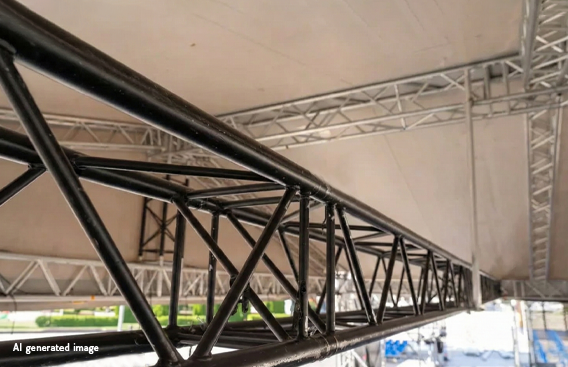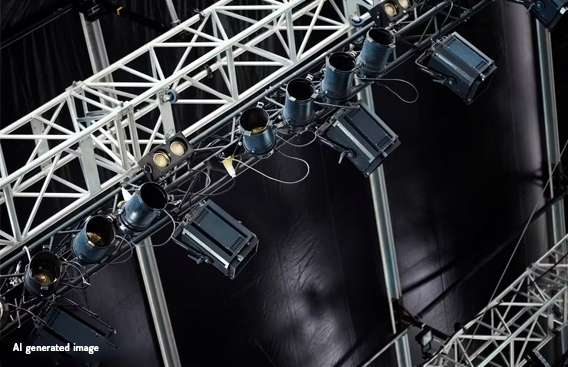British coroner says Zac Cox given substandard equipment by managers at World Cup venue.
The only western construction worker killed in the building of World Cup stadiums in Qatar was provided with substandard equipment by managers who should have known the risks of a “downright dangerous” environment, a British coroner has said.
Zac Cox, 40, died in January 2017 after he fell 40 metres (131ft) from rigging when a catwalk he was helping to install at the Khalifa stadium in Doha collapsed. The accident occurred after lever hoist equipment failed, causing part of the platform on which Cox and a colleague were working to fall.
The coroner, Veronica Hamilton-Deeley, told Cox’s inquest in Brighton on Tuesday: “Many managers knew and should have known they were effectively requiring a group of their workers to rely on potentially lethal equipment.”
She said the changes introduced to speed up the installation of the catwalks were “chaotic, unprofessional, unthinking and downright dangerous”.
Hamilton-Deeley added that “a perfect storm of events” led to Cox’s death, including a decision by the contractors to speed up the building of the stadium’s roof. That move required the use of additional lever hoists that a fellow construction worker told the inquest were only worthy of the rubbish bin.
The coroner said: “If you cut to the quick, the root cause of the accident was that the workers were being asked to use equipment that was not fit for purpose. Horribly simple, really.”
Documents submitted to the inquest included an incident investigation report prepared by the contractors, which acknowledged that the lever hoists did not have up-to-date safety certificates and that the health and safety system was not followed.
Jon Johnson, a fellow construction worker who witnessed the incident, told the inquest that he did not like the look of the rusty lever hoists, saying: “Bolts were missing, some of the mechanisms hardly functioned, and there were parts missing from them. They were rubbish. They should have been thrown in the rubbish bin.”
The report, completed within 11 days of Cox’s death, was never given to his British relatives by the stadium construction contractors. One of the contractors, the German firm Pfeifer, told the Guardian the document was never given to the family because it was an internal report.
After Cox’s death, the Qatari authorities arrested his friend and work colleague Graham Vance, accusing him of negligence and seeking his imprisonment for a maximum of three years. Detained in Qatar pending his trial and an appeal by the prosecutors, Vance was allowed to return home to South Africa only after 10 months. He was eventually acquitted of responsibility for Cox’s death, and has described the months awaiting trial as “a year of hell”.
Vance was detained by the Qatari authorities even though the internal company report pinned much of the blame for the accident on the provision of uncertified equipment. The report was obtained by lawyers acting for Vance.
Contracts for different aspects of the Khalifa stadium construction work are held by a joint venture between Midmac Six-Construct, Pfeifer, and Eversendai. There is a dispute as to who was responsible for ensuring that the safety certificates were available.
The internal report said the third-party certificate for the hoist had expired months earlier. It also revealed that pressure to speed up the construction of the platforms led to the introduction of unchecked lever hoists.
It said there were serious errors of judgment in the events leading to Cox’s death, and that the management system for the site “was not followed and in some cases not understood by key persons in the Pfeifer organisation” and that there was a lack of monitoring.
The report also blamed human error by the construction workers, including a failure by Cox to wear a second harness, but his colleagues say there was no requirement to wear a second harness for the specific work he was doing.
Vance was arrested within hours of the accident. “I was devastated,” he said. “Imagine being arrested just after seeing a co-worker fall about 40 metres and die. I was talking to him minutes before he fell and even tried to grab the rope when it snapped. My hands were cut and bruised from trying to save him but the police did not care – they wanted to blame someone.”
Stuart Laubscher, a family friend and lawyer, flew to Qatar to assist Vance. He said the internal report had not been circulated, even though it would have exonerated Vance. Pfeifer said the report was unofficial and therefore “not relevant”.
Laubscher said: “In all my experience of the law I have never seen anything like this. The first thing I questioned was why the internal report had not been submitted to the court.”
Cox’s British sister-in-law has written to the British Foreign Office minister, Alistair Burt, asking him to investigate. Ella Joseph said: “The decision to sit on this report rather than publish it and act on it is deeply distressing to us, and we will no longer remain silent.”
Saying that the family had seen no evidence that Vance was responsible for Cox’s death, Joseph added: “We are therefore greatly relieved that he has now been completely exonerated. We are, however, gravely concerned that his lawyer has alleged that key evidence that would have made plain his innocence from the start was withheld from the Qatari court.”
The family called for an independent inquiry to ensure that those responsible for the decisions that led to Cox’s death were held accountable.
Hassan al-Thawadi, the secretary general of the supreme committee for delivery and legacy, the body in Qatar overseeing the 2022 World Cup, wrote to the family on 21 February saying “it had continuously encouraged the contractor to share information about the accident, and the various investigations into its cause”.
It added that it had not been appropriate for the delivery authority to contact the family until the court proceedings in Qatar had ended.
Pfeifer said in a statement: “All official information in the possession of Pfeifer GmbH has been immediately forwarded to the family. The internal investigation report does not constitute an official report conducted by the Qatari authorities and therefore is not relevant. All information has been communicated to the Qatari authorities.”
Pfeifer added that it understood the tragedy and strain of the case for the family and was in regular contact with them. It said that as well as providing support and accommodation for Vance in Qatar, it had covered his legal fees “as an act of individual and personal support”. It also noted that no employee had been questioned by the Qatari prosecution authorities during the case.
In a statement, the delivery committee said “several systemic failures and human errors contributed to this incident”. It added that after an investigation, it had ordered a comprehensive mandatory review of working at height practices, among other measures.
It said it “deeply regrets not establishing a direct communication with the family of Cox during this time”, and added that it had since contacted them and offered its full support.
[The Guardian | Patrick Wintour, Diplomatic editor – link to the original article]





